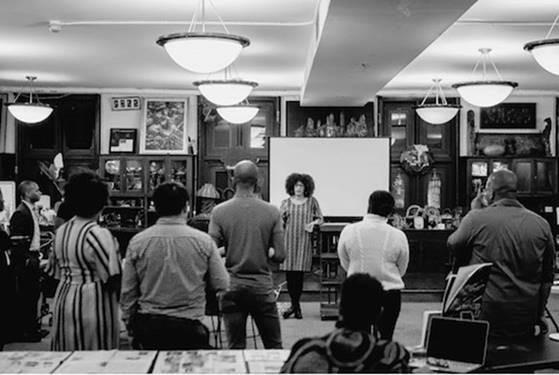
BlackSpace Urbanist Collective at Brownsville Heritage House, Brooklyn, New York. Photo / Joshua Broadway
Design Justice Workshop: Black Memory Workers and their Spatial Practices: Explorations on African American Heritage Spaces in New York City (ARCH 6408/6509, ASRC 6380, SHUM 6308)
Wednesdays 9:05–11 a.m.
Course Instructors: Peter Robinson, visiting critic, architecture; and Riché Richardson, associate professor, Africana Studies
This Design Justice Workshop introduces Phase III of Cornell's Mellon Collaborative Studies in Architecture, Urbanism, and the Humanities. Taught as a four-credit seminar, the course provides a unique and exciting opportunity to ponder the politics of race, place, and space in New York City with an emphasis on sites related to Black heritage, especially the Brownsville Heritage House. So often, Black bodies have been routinely excluded, marginalized, othered, and criminalized within urban spaces, especially in the face of gentrification, while being delinked from public and private models of architecture perceived as being most desirable. This course, rooted in the Black radical tradition, radicalizes spatial thinking, draws on community partnerships with programs such as My Brother's Keeper, and reveals what is possible when Black presence is welcomed and valued rather than pathologized or marked as a problem. Such questions are all the more urgent to grapple with in the wake of high-profile, tragic incidents intimately linked to home and neighborhood spaces — namely, the killings of Black people including Breonna Taylor, Botham Jean, Ahmaud Arbury, and George Floyd, whose death at the hands of police officer Derek Chauvin catalyzed Black Lives Matter protests in all 50 states and in cities around the world in May 2020.
This course welcomes graduate students and advanced undergraduates and will draw mainly on pedagogies and materials within the fields of architecture and urban planning. In our course of study, we will consider timely questions about monuments and symbols that stereotype Blacks and other people of color, and that, in the case of the Confederate flag, are rationalized by invoking heritage but linked to hate. We will take up readings that engage the politics of representing race and space in relation to Blackness from the end of the 19th century through the 20th and 21st centuries, beginning with an examination of public exhibitions such as the World's Colombian Exposition in Chicago of 1893 and the Cotton Exposition in Atlanta in 1895. And, we will reflect on the specific impact of events such as natural disasters on architectures in Black communities. Students will have opportunities to work on both individual and group projects for peer review.
Students who participate in this course will receive a $1500 stipend to support their work, as well as sponsorship for a field week in New York City where they will have opportunities for dynamic engagements with a range of Black heritage sites. Our visit to Heritage House, for example, will allow us to explore a landmark and premier institution invested in preserving the material culture of everyday Black lives in the city, a collection and legacy not widely known.